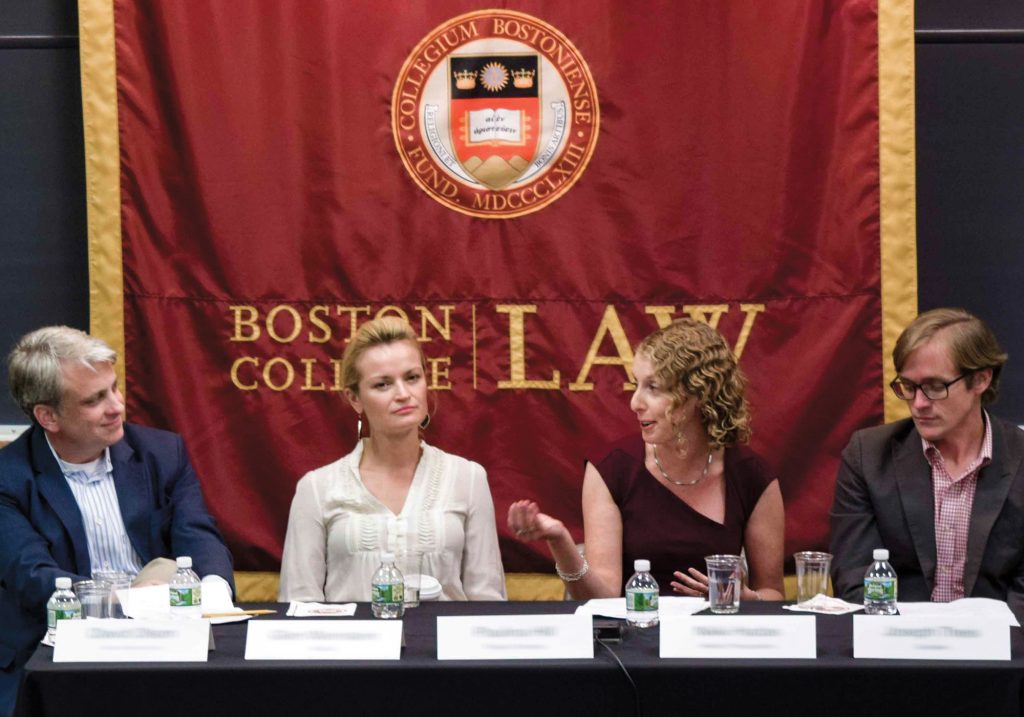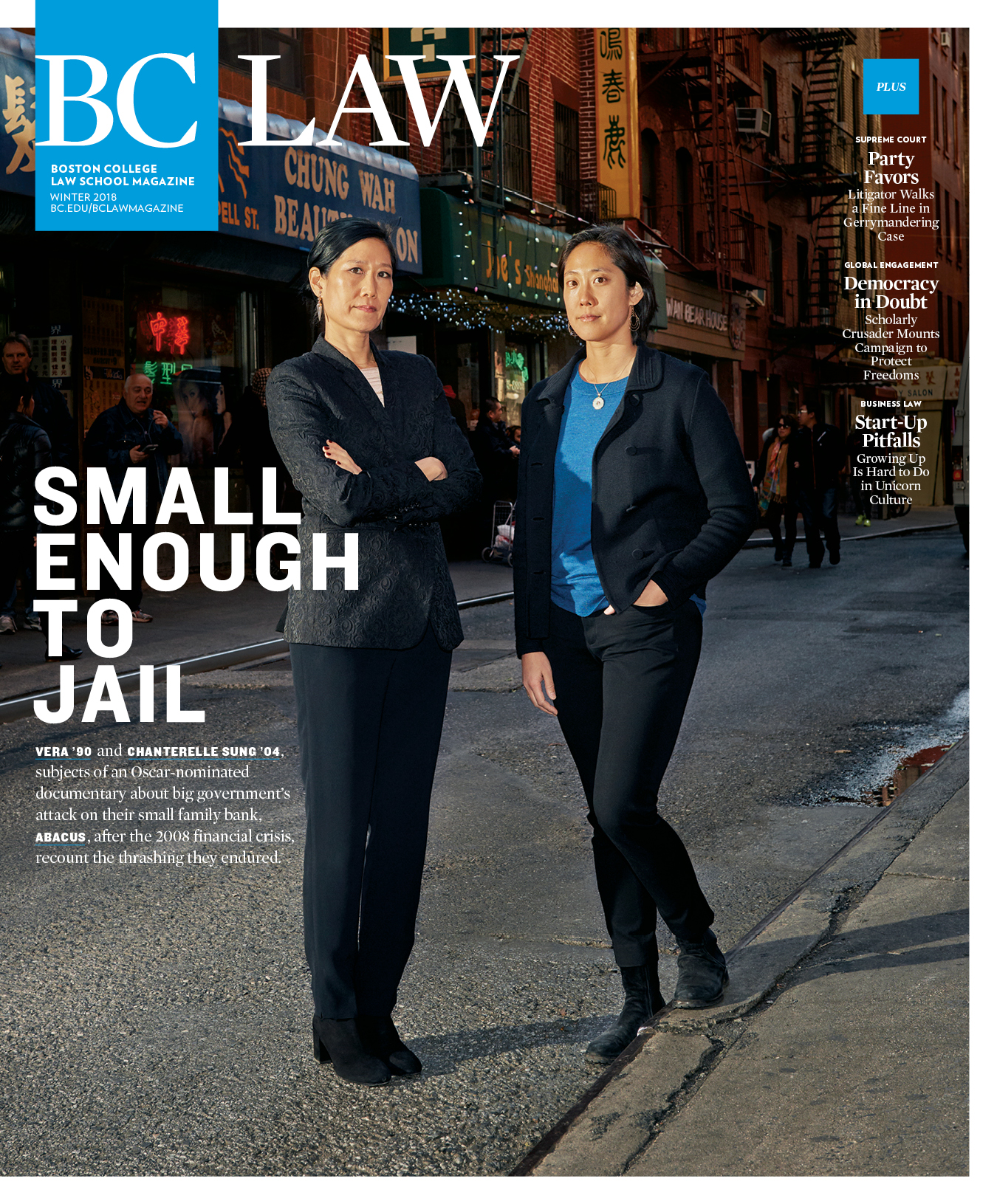Academic undertakings designed to enhance collaborations and the Law School’s business offerings got into full swing last semester.
Program on Innovation and Entrepreneurship (PIE)
Professor David Olson is faculty director of the Program on Innovation and Entrepreneurship (PIE), which endeavors to build partnerships between the Law School and outside entrepreneurs in intellectual property, health care, biotechnology, and other growth industries. It will do so largely by hosting speakers, discussions, and conferences locally and across the nation. “Rich discussions, cutting-edge research, and intellectual exchange will be hallmarks” of the program, said Dean Vincent Rougeau.
PIE’s launch event was a panel discussion in October about the role of law and lawyers in an innovation economy. Olson moderated the conversation that featured Akebia Therapeutics’ Nikki Hadas, ’97, Goodwin’s Joseph Theis, ’03, Polaris Partners’ Paulina Hill, and iRobot’s Glen Weinstein. The event was a great way, Olson said, “for the BC Law community to hear four top experts in the fields of biotechnology, high-tech robotics, venture capital, and related legal services discuss the state of innovation and entrepreneurship in Greater Boston right now.”
This semester PIE has already partnered with IBM Security on an event in Cambridge that included a tour of the IBM Cybersecurity Range and discussions with technical, business, and legal pros who gave examples of innovation and entrepreneurship in the space. Upcoming is a PIE collaboration with the student Sports and Entertainment Law Society to present a four-panel symposium on everything from wearable technology to the commercialization of sports venues and government relations.
“It is particularly fitting that BC Law should embrace as part of its mission [of service] a deep engagement with these important areas and with the novel legal issues they raise,” said Dean Rougeau.
Tax Policy Collaborative
BC Law’s renowned tax program now encompasses the BC Law Tax Policy Collaborative, which brings under one umbrella the many activities of scholars and students related to the study of tax law. Within the collaborative, tax faculty engage in a range of issues—for example, they explore how countries, states, and localities raise revenue to finance the provision of public goods, and they ask micro- and macroeconomic questions about whether the rules are fair, how they influence taxpayer behavior, and how they impact the level and shape of economic activity within countries and more globally.
The nation’s new tax reform law was a reminder that tax policy impacts everyone and its study implicates fundamental issues of redistribution, economic justice, and the social safety net. The collaborative enables faculty and their students to lead the conversation around such matters as domestic and international taxation, employee benefits and retirement security, charitable giving and philanthropy, and wealth transfer taxation.
The aptly named Tax Policy Collaborative encourages the Law School’s tax specialists—James Repetti ’80, Diane Ring, Shu-Yi Oei, and emeritus Hugh Ault—to tap into the resources of faculty colleagues with related expertise, including Ray Madoff (philanthropy and estates) and Patricia McCoy (finance and regulation), Renee Jones (corporate and securities law), and Natalya Shnitser (retirement security), among others.
The collaborative is also outward-facing. It includes the Boston College Law School Tax Policy Workshop for academics, policymakers, and practitioners to discuss papers and works-in-progress. It is part of the Boston College-Tulane Tax Roundtable wherein tax scholars from around the country—together with BC and Tulane students—debate policy and discuss drafts of participants’ papers. And it organizes symposia and conferences such as the recent “The Centennial of the Estate and Gift Tax: Perspectives and Recommendations.”
“The Tax Policy Collaborative brings a variety of experience to bear on economic issues that affect every human being in our society,” said Dean Rougeau. “It enables the excellent work of our tax scholars and our tax law program.”
Regulation and Markets Workshop
Another newcomer is the Regulation and Markets multidisciplinary workshop, which focuses on the study of regulatory approaches to markets and business. Organized by Professors Oei and Shnitser, the workshop investigates how such economic regulation should be designed in order to balance the interests of various constituencies. It explores how traditional approaches to regulation compare, contrast, and intersect with emerging methodologies.
The workshop creates opportunities for scholars working on economic regulation issues to present their research and for BC Law students to participate by enrolling in the related seminar, attending the workshops, and discussing with faculty the works-in-progress being presented.
Photograph: From left, Glen Weinstein, Paulina Hill, Nikki Hadas ’97, and Joseph Theis ’03.



